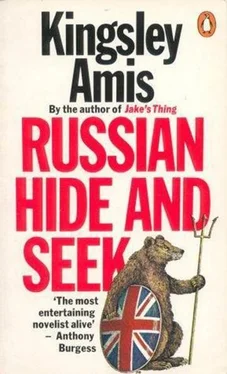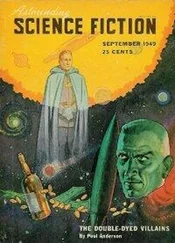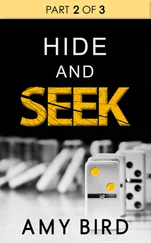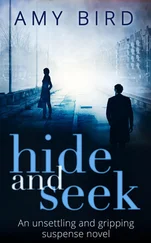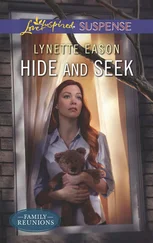Kingsley Amis - Russian Hide-and-Seek
Здесь есть возможность читать онлайн «Kingsley Amis - Russian Hide-and-Seek» весь текст электронной книги совершенно бесплатно (целиком полную версию без сокращений). В некоторых случаях можно слушать аудио, скачать через торрент в формате fb2 и присутствует краткое содержание. Жанр: Современная проза, на английском языке. Описание произведения, (предисловие) а так же отзывы посетителей доступны на портале библиотеки ЛибКат.
- Название:Russian Hide-and-Seek
- Автор:
- Жанр:
- Год:неизвестен
- ISBN:нет данных
- Рейтинг книги:3 / 5. Голосов: 1
-
Избранное:Добавить в избранное
- Отзывы:
-
Ваша оценка:
- 60
- 1
- 2
- 3
- 4
- 5
Russian Hide-and-Seek: краткое содержание, описание и аннотация
Предлагаем к чтению аннотацию, описание, краткое содержание или предисловие (зависит от того, что написал сам автор книги «Russian Hide-and-Seek»). Если вы не нашли необходимую информацию о книге — напишите в комментариях, мы постараемся отыскать её.
A handsome and highly sexed young Russian cavalry officer, Alexander Petrovsky, joins the plot and learns to his regret that politics and playmates don't mix.
"Funny, cynical, captivating-Amis makes an implausible situation almost believable, then lets his characters worry their way out." (B-O-T Editorial Review Board)
Russian Hide-and-Seek — читать онлайн бесплатно полную книгу (весь текст) целиком
Ниже представлен текст книги, разбитый по страницам. Система сохранения места последней прочитанной страницы, позволяет с удобством читать онлайн бесплатно книгу «Russian Hide-and-Seek», без необходимости каждый раз заново искать на чём Вы остановились. Поставьте закладку, и сможете в любой момент перейти на страницу, на которой закончили чтение.
Интервал:
Закладка:
‘How soon could you do it, Alexander?’
‘I’m sorry, I was miles away, trying to think of something a clergyman said to me the other week.’ The thoughts, set off by the allusion to Korotchenko a moment before, had in fact been about Mrs Korotchenko, and of an intensity such as to induce their thinker to pull his chair in further under the table. Part of the rest of the morning was thereby predetermined.
‘I thought it might be useful if you visited one of these old boys, or more than one, investigated attitudes and reported back to Commissioner Mets.’
‘I’d be delighted. As to how soon, today possibly, tomorrow for certain.
‘Splendid, I’m most grateful,’ said Mets, all warmth and condescension now that resistance had become vain. He took a list of names and addresses from his dispatch-case and Alexander noted down one he said he had sufficient acquaintance with. Mets expressed gratitude for his contribution.
‘May I make a final contribution?’ he asked. ‘Or rather two? The first is just a question. Wouldn’t it have been more natural to inaugurate the New Policy with a festival of sport instead of visual arts and the rest? It was far more popular.’
‘And infinitely more bloody,’ said Mets, gravely shaking his head. ‘Faction battles at soccer and race riots at cricket.’
‘All the pre-wars I know say that all that is much exaggerated.’
‘Well, they would, of course. Anyway, I have no say in the matter.’
‘My other contribution is another question. Don’t you think your difficulties might be lessened if you left it to the English to organise matters instead of doing so for them? At present they must feel it’s our project, not theirs.’
‘I sympathise with that, and it is our eventual aim, but at the moment we can’t leave it to the English to do anything. We must learn to walk before we can run.
‘How well I know that expression.’ Alexander glanced at his father, who to a knowing eye looked faintly uncomfortable. ‘Can they not at least be given a plausible illusion that they’re in charge? It would make it easier for those who are looking for an excuse to participate.’
‘A very fair point,’ said Mets, writing on a pad, ‘and one I’ll bear in mind in the general context. Renewed thanks. Have a good day.
‘I hope we meet again soon, sir. - Cheerio, dad.’
There was politeness in Mets’s rising to his feet and a morsel of real cordiality in his handshake and parting smile. Alexander listened to the silence behind him as he walked down the room and out into the west hall; his father, he knew, was waiting to ask Mets if he didn’t think that that was a fine lad. The old idiot! -would he never hit back when baited? But there were more important concerns than fathers ahead, and Alexander forgot his almost before he had shut the dining-room doors after him.
5
A quarter of an hour later Alexander and Polly the mare were moving at a gentle canter past the spot where he had persecuted the sheep, an incident that failed to recur to his mind. He was in a kind of hurry, but his goal would stay till he came; it was a beautiful morning and there was much to look at in the scene about him, if he could only concentrate his attention on it. This proved difficult; somehow it always did; the run of the hoofbeats, the steady leaping motion of the horse under him, the unchanging sunshine were perhaps, in this case, what caused his eyes to lose their focus, so that he gazed rather than looked. Another and habitual distraction stemmed from ignorance. He could particularise no further from grass, flower, bush, tree, tree-stump than he could from sun or sky. Only the grosser objects on view penetrated to him: a stretch of canal with a towing-horse just coming into view round a bend, a great broad road ultimately linking London and Birmingham with lesser roads passing above and below it and elaborate access systems. His eye was caught by a metal sign, flaked and corroded far past legibility but still bearing a trace of blue paint. Horse and mule traffic passed to and fro on the main roadway and, in the distance, the sunlight winked off the metalwork of a motor-car.
Alexander’s path took him now between fields of standing grain, wheat on one side, as he could have recognised if he had looked, barley on the other, as he could not. After that came row after row of the green tops of some root vegetable which a man was furthering with a device on the end of a pole, and after that came a house, but for its dilapidated tile roof a nearly cubical object of concrete and two sorts of brick irregularly distributed, as though to insist on its unlikeness to all others whatever. If such had really been the architect’s purpose it was at once undone by the next house, and the next, and the next. Soon Alexander was walking his horse between a double row of identical unique dwellings; to them he did pay attention, and of a friendly sort. They showed him the end of his journey was near and, more than that, he knew them to be among the very last houses in the district built before the Pacification. They always put him in mind of that legendary era, and so he looked at them with respect, even a little awe. There was no one to offer him the opinion that they were offensive to the eye and the mind.
The main street of the village was quite different. It had in it many of the things appropriate to such a street in the middle of England: a post office, a grocer’s shop, a greengrocer’s, a butcher’s, a baker’s, a barber’s, a saddler’s, a newsagent’s (though the news he supplied came in only two forms, Russian and an English translation), a bank, an eating-house, a small cinema, houses by the dozen. But there was no garage, book-shop, pub or church, nor any building that had formerly served those functions, for the most visible difference between centre and outskirts was that nothing here had stood for more than fifty years. The whole of the original street had been destroyed, some said by fire, in a single day and night, during which period an unknown number of people died, some said Russians as well as English, women as well as men. But it was impossible to say such things with any certainty, because no English survivor had ever been found, nor any English witness; the village had been a Russian military post during the Pacification and its inhabitants evacuated to neighbouring villages. Soon afterwards, in a move possibly related to the events of that day and night, the authorities had officially renamed it New Kettering, but this had never caught on among the English and today even the Russians called the place Henshaw.
The street itself, the road-surface, was remarkably smooth along the middle, owing in great measure to the careful maintenance of the rammed rubble in the various pot-holes. Sickly trees, their lower parts protected by wire guards, stood at twenty-metre intervals along the edges of the gravel footpaths. The buildings, two- or one-storeyed, mostly wooden (there had been plenty of timber then), were the product of English labour under Russian supervision and recalled the domestic designs of neither country. They were narrow from front to back, with few and small windows. That school of architects and furnishers which had ruled, a century earlier, that an object made with nothing but utility in mind must be beautiful might have been strongly impressed by the results of such single-minded rejection of the superfluous. Dark greys and browns predominated, but here and there a shop-sign or a painted door-frame showed a touch of brighter colour.
The people on view at this hour, nearly all of them women, were clothed after much the same style. They had turned out in some numbers, many of them to join the queues outside the greengrocer’s (soft fruit on sale) and the butcher’s (fresh-meat day). They smiled, greeted one another, gossiped, even laughed. The weather was going to be fine again, husbands and sons would be pleased with their suppers and things in general were no worse than last year,. indeed there had been positive improvements, of which the most momentous was the recent introduction of a third fresh-meat day in the week. Some had heard their elders speak of strikes, often adding that whatever else the Russians had done they had certainly put a stop to all that, and the more thoughtful, after an honest attempt to imagine themselves living through a strike, would feel a glow of comfort. Now, as Alexander passed, quite a few of the villagers looked up at him. A middle-aged man touched his hat, although the ordinance requiring this had long lapsed. The glance of all was without fear, without respect, without hostility, all but a pair of obvious pre-wars, husband and wife, who showed a faint, faded contempt as they turned their backs.
Читать дальшеИнтервал:
Закладка:
Похожие книги на «Russian Hide-and-Seek»
Представляем Вашему вниманию похожие книги на «Russian Hide-and-Seek» списком для выбора. Мы отобрали схожую по названию и смыслу литературу в надежде предоставить читателям больше вариантов отыскать новые, интересные, ещё непрочитанные произведения.
Обсуждение, отзывы о книге «Russian Hide-and-Seek» и просто собственные мнения читателей. Оставьте ваши комментарии, напишите, что Вы думаете о произведении, его смысле или главных героях. Укажите что конкретно понравилось, а что нет, и почему Вы так считаете.
